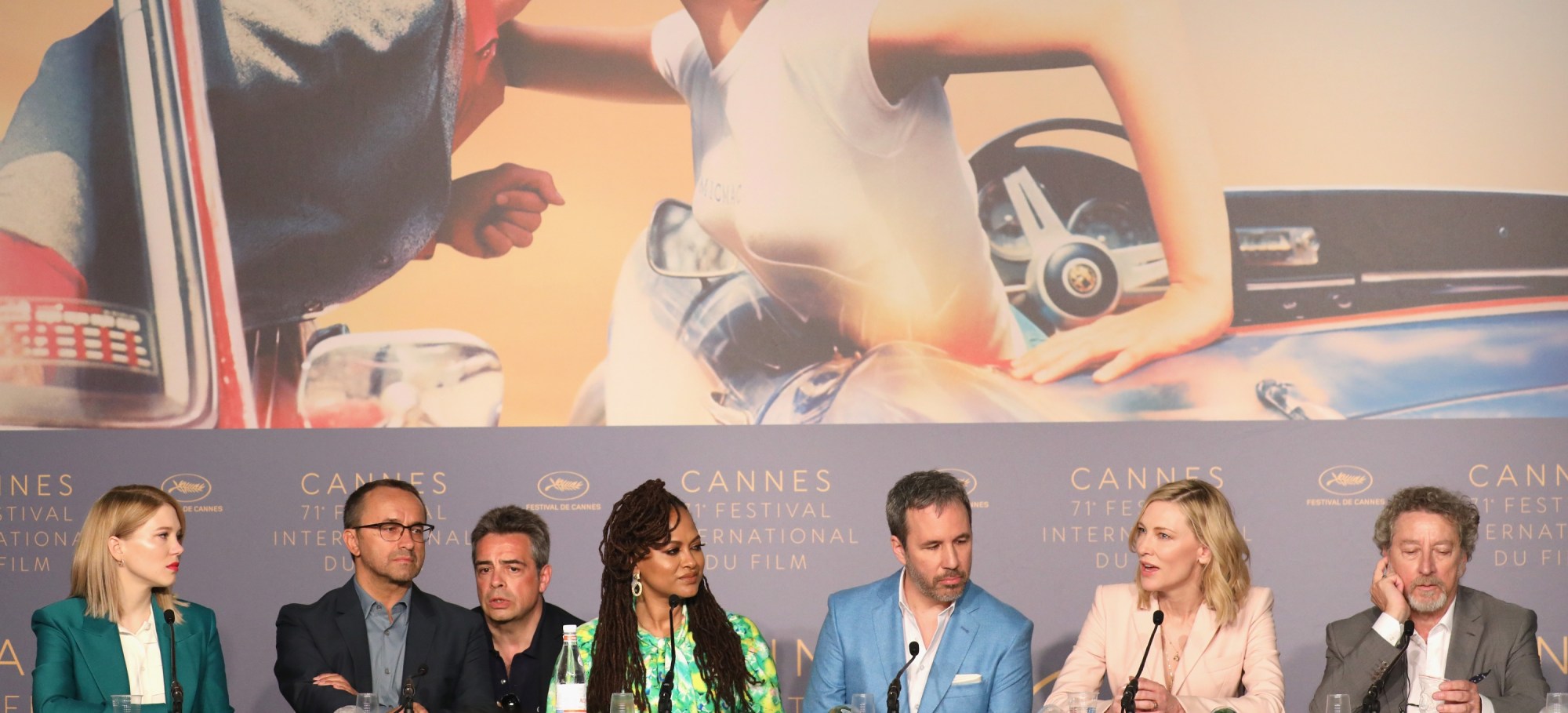
- Festivals
Cannes 2018, Act 1: Cate Blanchett Presents the Jury
And we’re off….Hours before the opening ceremony and the screening of Asghar Farhadi’s Spanish language Todos lo saben, starring the high voltage husband-and-wife team of Javier Bardem and Penélope Cruz, the Competition Jury press conference signaled the 71st Cannes Film Festival is officially underway. The nine-person panel that will judge this year’s competition is headed by Cate Blanchett and composed of Taiwanese actor Chang Chen, actresses Kristen Stewart and Léa Seydoux, Burundian singer-songwriter Khadja Nin and directors Ava DuVernay, Robert Guédiguian, Denis Villeneuve and Andrey Zvyagintsev. At the photocall, the flashes were all for the President and the other four women of this female-majority jury. Later in the Palais’ overflowing press room, the questions moderated by Canal + journalist Didier Allouch were mostly for Madame la Présidente who handled the proceedings with the assuredness you would expect from a seasoned professional. And many of those concerned the female presence not only on the panel but at the festival in light of the issues which have become front and center in the post-#metoo industry.
“Being attractive does not preclude being intelligent,” said Blanchett after being asked if the glamour the festival exudes on its fashionable red carpets didn’t to some extent belie the current discussion of female image and the effort to overcome stereotypes. “That discussion will have harmony and discord just like in the real world, and just like the world, it would be terribly boring if it didn’t.” Blanchett is not the first woman to head a Cannes jury (that honor belongs to Olivia De Havilland, who was jury president her in 1965) but her term comes in a moment of special industry introspection about the treatment of women. Even so, only three of the 21 directors vying for the Palme are women.
“A few years ago there were only two women now there are three. (Progress) will not happen overnight and coming to Cannes is almost a gladiatorial endeavor, you have to be ready for it. Would I like to see more women recognized? Sure, but we are faced with this selection now,” said the actress noting that the selection committee screened upwards of 1500 films. “We are looking at them not as required categories but as the films in front of us.”
“The Jury must try to attend what to the artists are trying to say. Personally, I am not only interested in films which win a prize, but also in those for which there is buzz in the grapevine. (Cannes) is a wonderfully porous festival. What drew me to the jury is being in dialogue with these extraordinary jury members, but also with the wonderful artists representing world cinema.”
That seemed to beg the inevitable question – promptly posed – of why do movies still matter in today’s word? An answer was ventured by Canadian director Denis Villeneuve who remarked on art’s essential role in reflecting upon life. Undoubtedly humanity repeats its mistakes and artists are there since the beginning of time to try and examine what happens. Cinema is a powerful tool to do it. Especially today when we are in a time where truth is in danger. Cinema should bring forth the truth.” “Yes,” added Kirsten Stewart seconding that statement as one part of a two-fold role: “Cinema holds up a mirror to what’s happening and also allows you to explore things you would never otherwise know. It’s about introspection but also exploration of things alien to you.
“Cinema is voice,” stated Ava DuVernay reminding that “from where I am in California, I was able to understand the humanity of a family in Iran or in Shanghai. Cinema also allowed me to bring my voice into the world. It brings us together from all over and (allow us to ) speak to each other through films.”
Wrapping up the proceedings Blanchett warned about the judging process that
“the task is impossible. We will disappoint inevitably (but) the wonderful thing about Cannes is that is formed by the artists in the jury, the critics, and the audience. Each group might think differently and that’s wonderful.” Concluding: “I’m going into the process with a genuinely open mind.”

